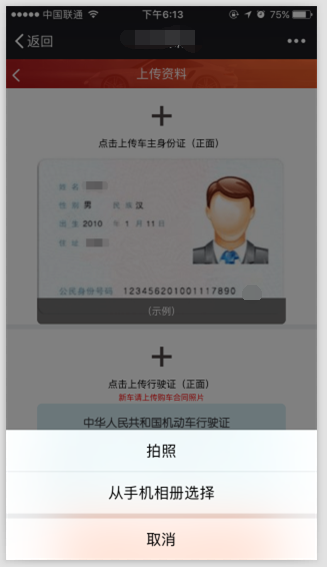之前那篇微信JS-SDK授權的文章實現了分享接口,那麼這裡總結一下如何在微信裡面通過js調起原生攝像頭,以及上傳下載圖片。
1.配置
頁面引入通過jssdk授權後,傳入wx對象,首先配置需要的接口
wx.config({
/* debug: true, */
appId: appid,
timestamp: timestamp,
nonceStr: nonceStr,
signature: signature,
jsApiList: [
'chooseImage',//拍照或從手機相冊中選圖接口
'previewImage',//預覽圖片接口
'uploadImage',//上傳圖片接口
'downloadImage'//下載圖片接口
]
});
2.調起拍照/相冊
將下面的方法放在需要點擊事件的回調函數裡面
wx.chooseImage({
count: 1, //張數, 默認9
sizeType: ['compressed'], //建議壓縮圖
sourceType: ['album', 'camera'], // 來源是相冊、相機
success: function (res) {
//var localIds = res.localIds; // 返回選定照片的本地ID列表,localId可以作為img標簽的src屬性顯示圖片
$('.driver-card img').prop('src',res.localIds[0]);
uploadPhoto.uploadToWeixinServer(res.localIds[0],'car')
}
});
這時我們可以看到這樣的效果,代表調起成功了!chooseImage方法的成功回調裡,我將選中的照片賦值給需要顯示的img的src(因為我這裡只有一張照片,如果有多張用循環賦值即可),這樣一來,就可以直接顯示剛剛拍照/相冊裡選中的照片了

3.上傳照片
在上面chooseImage的success回調裡面,可以看到我調用了uploadToWeixinServer方法,參數為本地照片的Id
uploadToWeixinServer: function(localId,type){
wx.uploadImage({
localId: localId,
isShowProgressTips: 1, // 默認為1,顯示進度提示
success: function (res) {
//res.serverId 返回圖片的微信服務器端ID
uploadPhoto.uploadToOwnerServer(res.serverId,type);//異步上傳到我們自己的服務器
}
});
},
調用uploadImage接口後,將圖片上傳到了微信服務器,返回圖片的ID,這個時候需要用ajax異步上傳到自己的服務器裡,調用微信提供的“獲取臨時素材”接口。當然也不一定是選擇完照片就立即上傳,還得根據實際業務需求出發,也有是靜默上傳(沒有進度提示),也有是在最終提交表單時一起上傳
js:
uploadToOwnerServer: function(serverId,type){
$.ajax({
data: {serverId:serverId,type:type},
type : "POST",
url : WX_ROOT + "wechat/uploadPhoto",
success : function(json) {
if (json) {
var data = JSON.parse(json.data);
if ('car' == type)
uploadPhoto.options.carImage = data.path + data.name
else
uploadPhoto.options.idCardImage = data.path + data.name
}
}
});
},
Controller
@RequestMapping(value = "/uploadPhoto", method = RequestMethod.POST)
public @ResponseBody HttpResult uploadPhoto(@RequestParam String serverId,@RequestParam String type) throws Exception{
LOGGER.info("RestFul of uploadPhoto parameters serverId:{},type:{}",serverId,type);
try {
/** 將圖片保存到本地服務器 **/
String photoName = type + new Date().getTime() + UUID.randomUUID().toString();
//文件路徑不存在則創建
File saveFile = new File(PIC_PATH + type);
if (!saveFile.mkdir()) saveFile.mkdir();
wechatService.saveImageToDisk(serverId, photoName, PIC_PATH + type + "/");
LOGGER.info("Download the picture from weixin server pathL:{}",PIC_PATH + type + "/");
JSONObject data = new JSONObject();
data.put("name", type + "/" + photoName+".jpg");
data.put("path", PIC_SERVER + "/");
HttpResult rs = new HttpResult();
rs.setCode(200);
rs.setData(data.toJSONString());
LOGGER.info("Download the picture from weixin server is successful!serverId:{},photoName:{}",serverId,photoName);
LOGGER.info("HttpResult data:{}",rs.getData());
return rs;
} catch (Exception e) {
LOGGER.error("Download the picture from weixin server is error",serverId);
return null;
}
這裡我使用了一個UUID生成主鍵規則,通過類型+時間戳+唯一字符串定義圖片名稱。如果上傳成功,同時又將自己服務器的圖片地址返回給前端。
getInputStream
調用微信提供的獲取臨時素材接口下載還在微信服務器上的圖片,參數為前端提交上來的媒體文件ID,最終將文件轉化為輸入流對象
/**
* 根據文件id下載文件
* @param accessToken
* @param mediaId
* @return 文件流對象
*/
public InputStream getInputStream(String accessToken, String mediaId) {
InputStream is = null;
String url = "http://file.api.weixin.qq.com/cgi-bin/media/get?access_token="+ accessToken + "&media_id=" + mediaId;
try {
URL urlGet = new URL(url);
HttpURLConnection http = (HttpURLConnection) urlGet.openConnection();
http.setRequestMethod("GET"); // 必須是get方式請求
http.setRequestProperty("Content-Type","application/x-www-form-urlencoded");
http.setDoOutput(true);
http.setDoInput(true);
System.setProperty("sun.net.client.defaultConnectTimeout", "30000");// 連接超時30秒
System.setProperty("sun.net.client.defaultReadTimeout", "30000"); // 讀取超時30秒
http.connect();
// 獲取文件轉化為byte流
is = http.getInputStream();
} catch (Exception e) {
LOGGER.error("Failed to convert inputStream from weixin server,accessToken:{},mediaId:{}",accessToken,mediaId);
}
return is;
}
service
通過循環解析流對象,將文件寫入自己的服務器
public void saveImageToDisk(String mediaId, String picName, String picPath) throws Exception {
String accessToken = getBaseAccessToken();
InputStream inputStream = getInputStream(accessToken, mediaId);
// 循環取出流中的數據
byte[] data = new byte[1024];
int len = 0;
FileOutputStream fileOutputStream = null;
try {
fileOutputStream = new FileOutputStream(picPath+picName+".jpg");
while ((len = inputStream.read(data)) != -1) {
fileOutputStream.write(data, 0, len);
}
LOGGER.info("Write the fileInputStream is successful");
} catch (IOException e) {
LOGGER.error("Write the fileInputStream is error");
} finally {
if (inputStream != null) {
try {
inputStream.close();
} catch (IOException e) {
LOGGER.error("Close the fileInputStream is error");
}
}
if (fileOutputStream != null) {
try {
fileOutputStream.close();
} catch (IOException e) {
LOGGER.error("Close the fileOutputStream is error");
}
}
}
}
4.總結
那麼到這裡,簡單的拍照,展示圖片,上傳下載的功能都已經完成,其實代碼就是最好的注釋!微信開放的jssdk提供了很多友好而有趣的功能,接下來還需要繼續實踐研究....
以上就是本文的全部內容,希望對大家的學習有所幫助,也希望大家多多支持。